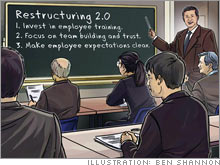Management 101: Lessons from SeoulSeoul has found a way to help companies deal with rising competition and disruptive layoffs. Business 2.0 wonders why Washington can't do the same.(Business 2.0 Magazine) -- We've all seen the kind of havoc that borderless trade can wreak on an established economy: the dislocation of whole industries, for starters, and millions put out of work. To combat the turbulence in our economy, the U.S. government is doing what it's always done, providing funds to retrain displaced workers and then relying on the free market to reallocate labor and capital.
Yet the strategy continues to fall short in a couple of key areas. First, while labor and capital are being "reallocated," they're often idle -- which in the case of labor means unemployed. Second, statistics suggest that while most employees who lose their positions to overseas rivals wind up with new jobs, the new ones typically don't pay as much. On a recent trip to Seoul, I saw a country responding to the disruption caused by foreign competition in a very different way. A little over three years ago, the government of South Korea, in conjunction with the Korean Labor Institute, launched the New Paradigm Center, a government-funded research and consulting organization with a mandate to study, consult on, and promote people-centered management practices, primarily in small and medium-size enterprises. NPC's literature lists a long series of programs and goals, including investing in employee training, team building, reducing work hours, increasing organizational trust, raising the level of employee satisfaction and engagement, and improving communication so employees understand their company's goals and precisely what is expected of them. To date, the NPC has worked with about 170 companies, some facing imminent financial ruin. The results are impressive. NPC's client companies have increased sales an average of 7 percent and boosted profits more than 26 percent. The companies also report a 60 percent rise in quality of products and services and a substantial reduction in accidents and injuries through revamped procedures. NPC's client companies also more than doubled the number of hours spent on training and invested nearly 50 percent more in learning and education. NPC executives told me that their companies are enjoying better industrial relations, increased trust and job satisfaction, and greater customer satisfaction. Many clients managed to grow their employment rolls while cutting back on average work hours. One example is Good Morning Hospital, a 400-bed facility in Pyongtaek that was struggling to reduce work hours and fill beds. NPC ran employee orientation programs and offered courses in nursing skills, stress management, foreign languages, and computer use. Hours decreased, new jobs were created, and revenue rebounded. Note that this type of government aid is not what is usually meant by "industrial policy." The government is not mandating what industries to get into or out of or directing investment in particular businesses or technologies. It's merely providing assistance to help companies be more effective and competitive. In today's knowledge-dominated economy, that usually means providing advice on how to make the employees crank out better work. During the 1990s, the U.S. Department of Labor, under former secretary Robert Reich, tried similar approaches, but they didn't last because of budget cuts and the belief that it's up to companies to figure out how to manage their workforce. Our leaders also assume we don't need assistance to encourage companies to better manage human capital. But having seen what one organization has done in a tough environment, I disagree. The NPC has worked wonders. And judging from our current levels of employee disengagement and distrust, America could use a new paradigm too. Business 2.0 columnist and Stanford Business School professor Jeffrey Pfeffer's latest book is "What Were They Thinking? Unconventional Wisdom About Management." To send a letter to the editor about this story, click here. |
|

